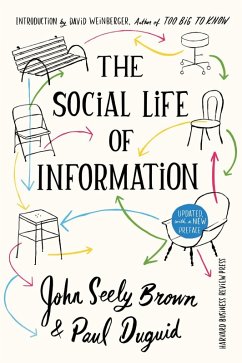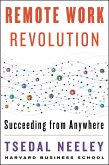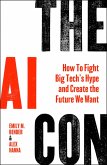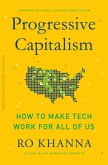Understand the human place in a digital world.
"Should be read by anyone interested in understanding the future," The Times Literary Supplement raved about the original edition of The Social Life of Information. We're now living in that future, and one of the seminal books of the Internet Age is more relevant than ever.
The future was a place where technology was supposed to empower individuals and obliterate social organizations. Pundits predicted that information technology would spell the end of almost everything-from mass media to bureaucracies, universities, politics, and governments. Clearly, we are not living in that future. The Social Life of Information explains why.
John Seely Brown and Paul Duguid show us how to look beyond mere information to the social context that creates and gives meaning to it. Arguing elegantly for the important role that human sociability plays, even-perhaps especially-in the digital world, The Social Life of Information gives us an optimistic look beyond the simplicities of information and individuals. It shows how a better understanding of the contribution that communities, organizations, and institutions make to learning, working, and innovating can lead to the richest possible use of technology in our work and everyday lives.
With a new introduction by David Weinberger and reflections by the authors on developments since the book's first publication, this new edition is essential reading for anyone seeking to understand the human place in a digital world.
"Should be read by anyone interested in understanding the future," The Times Literary Supplement raved about the original edition of The Social Life of Information. We're now living in that future, and one of the seminal books of the Internet Age is more relevant than ever.
The future was a place where technology was supposed to empower individuals and obliterate social organizations. Pundits predicted that information technology would spell the end of almost everything-from mass media to bureaucracies, universities, politics, and governments. Clearly, we are not living in that future. The Social Life of Information explains why.
John Seely Brown and Paul Duguid show us how to look beyond mere information to the social context that creates and gives meaning to it. Arguing elegantly for the important role that human sociability plays, even-perhaps especially-in the digital world, The Social Life of Information gives us an optimistic look beyond the simplicities of information and individuals. It shows how a better understanding of the contribution that communities, organizations, and institutions make to learning, working, and innovating can lead to the richest possible use of technology in our work and everyday lives.
With a new introduction by David Weinberger and reflections by the authors on developments since the book's first publication, this new edition is essential reading for anyone seeking to understand the human place in a digital world.
Dieser Download kann aus rechtlichen Gründen nur mit Rechnungsadresse in A, D ausgeliefert werden.
Praise for The Social Life of Information:
"A thoughtful and challenging read that belongs on the bookshelf of anyone trying to invent or make sense of the new world of information." - Amazon
"Essential Reading for Modern Managers" - Businessweek
"An intellectual gem" - Publisher's Weekly
"This deserves to be one of the best-read books of the internet age." - The Financial Times
"The Social Life of Information will help technologists keep an eye on the bigger picture and avoid the tunnel vision that can lead promising companies down blind alleys." - Eric Schmidt
"A thoughtful and challenging read that belongs on the bookshelf of anyone trying to invent or make sense of the new world of information." - Amazon
"Essential Reading for Modern Managers" - Businessweek
"An intellectual gem" - Publisher's Weekly
"This deserves to be one of the best-read books of the internet age." - The Financial Times
"The Social Life of Information will help technologists keep an eye on the bigger picture and avoid the tunnel vision that can lead promising companies down blind alleys." - Eric Schmidt









